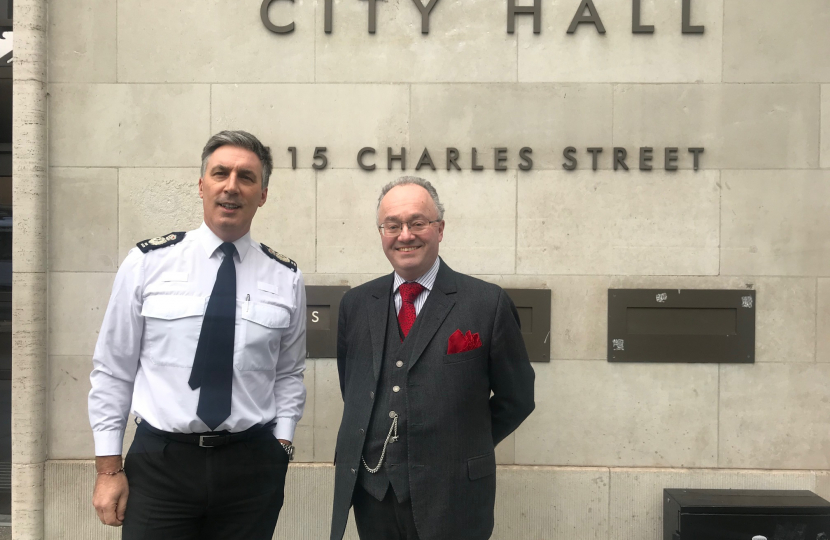
The budget for policing Leicester, Leicestershire and Rutland put forward by PCC Rupert Matthews, which includes a £620K transfer from the Commissioner’s Reserve budget to the force, has been endorsed by the Police and Crime Panel.
At a meeting held earlier today (1 February 2023) Mr Matthews told members of the Panel that Leicestershire Police is a good force, in parts outstanding (according to HMICFRS PEEL assessment in 2022) and required a robust budget to sustain the improvements in key areas of service witnessed since 2021.
The police precept** which will be paid by council taxpayers across Leicester, Leicestershire and Rutland remains below the East Midlands average, while the increase from last year is well below the rate of inflation. This will help those families struggling with the rising cost of living at this time.
Outlining his budget for 2023-24 Mr Matthews explained that it was designed to provide the Chief Constable with the resources needed to sustain the significant progress made thanks to his budget for 2022-23, in line with the pledges published in his Police and Crime Plan.
The budget will fund the works growing out of a strategic review of police stations and offices across the area. The review is well under way and is expected to deliver plans for more a visible policing estate in the future.
The budget also includes provision for maintaining the current number of officers, which is 35 more than the 297 recruited through the Uplift programme. These officers are now boosting the police presence across the force area. New vehicles, including hybrid models, have been added to the fleet increasing police visibility.
There will be a renewed focus on the training of officers, including special constables, and PCSOs be it in the use of tasers, community relations or dealing with ASB.
The public disorder in Leicester last year, and the subsequent investigations, have consumed large sums of money, and continue to do so. A review of policing of the disorder will report shortly and Mr Matthews is providing funding to help pay for the implementation of any recommendations.
The section of the budget allocated to the Office of the PCC will also include funding for projects aimed at reducing community tensions in the City. A revived relationship with the district, city and Rutland councils will be fully funded, delivering improvements such as the CCTV recently unveiled in Melton Mowbray.
The budget will also allow for the relaunch of the Commissioner’s Safety Fund in quarterly rounds to allow more time for applicants to formulate a detailed relevant bid, supported by bid writing workshops in each district. The budget will also cover the re-tendering of some of our most critical victim support and crime prevention provisions, guided by consultations and stakeholder engagement.
People Zones has gone from strength to strength and this budget will allow them to build on the work already achieved in the three areas. The established steering groups will be fully funded and will provide grant funding aligned to the research report recommendations from 2022.
Thanking the Chief Constable and his team for the work to deliver on his Police and Crime Plan, Mr Matthews said that this year’s budget had been prepared with great skill and dedication, at a time of great financial challenge, to protect this progress.
In a detailed presentation* covering the police revenue and capital budgets, the precept** and the force’s medium-term financial strategy, the financial imperative for public support to increase funding was evident.
“It is absolutely vital that we protect the improvements to police services seen since 2021,” said Mr Matthews. “It’s no secret that the current financial landscape for policing is the most challenging for over a decade. A nationally-set pay agreement for our local workforce, inflation and fuel costs have all put significant pressure on budgets so every avenue for savings and further ‘bang for each buck’ has been explored.
He informed Panel members that he had consulted the public of Leicester, Leicestershire and Rutland to establish whether they were willing to pay an extra £10, £12 or £15 towards policing and thanked all those who had responded. He said that he had received nearly 2300 responses from across the force area with just over half (50.3%) opting for an increase of £15 in their police precept.**
“I’m very grateful to everyone who responded to my consultation,” he added. “Their responses showed that their policing priorities, like mine, remain constant and that they are willing to pay a little more to see them delivered.”
In support of the budget and to help the force manage the current financial challenges, Mr Matthews has also transferred £0.62m from the Commissioner’s reserves to the Police Budget to boost spending on front line policing.
Late last year the Government announced that the precept referendum threshold had been confirmed at £15 for a Band D property, making it clear that the Government expected Police and Crime Commissioners to utilise this flexibility to shore up the funding for local policing.
With this in mind, the Commissioner proposed an increase of £15 a year, or 29p a week, for a Band D (the average) property taking the total amount of money that goes towards policing through the average property’s council tax bill to £273.23. This is approximately 13% of the whole Council Tax bill. Members of the Police and Crime Panel approved this proposal.
“Local people across the city and two counties have been telling me over the past year what their policing priorities are. My consultation confirmed their views. They indicated their willingness to support the work to deliver on these priorities, for which I am grateful,” said Mr Matthews.
“I can assure them that I will be ruthless in my scrutiny of the force’s performance and expenditure to ensure that they receive value for money. Leicestershire Police is an excellent force and I am determined to do everything I can to keep it that way.”
Editor notes:
- The full reports can be downloaded here
** The police precept is the small amount of the overall council tax bill that goes towards policing.
*** The £15 increase relates to a Band D (the average) property, Bands A-C will pay less than this, E-H will pay more.

